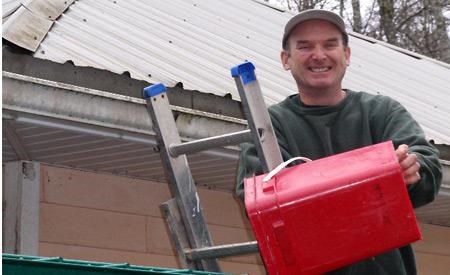To grow healthy plants there has to be good soil, says horticulturalist Dennis Premack, 48, of Texada Island. Different plants have different needs and it is important to meet those needs with appropriate soil to maximize the growing potential in the garden.
Premack has 30 years of experience in the growing industry, and says every vegetable, flower, shrub and tree has its own requirements for growth. “Basic soil, undisturbed in nature, varies with location,” he said. “Fortifying augments production. Corn, for example, likes a soil high in nitrogen, while cabbage likes lime.” The month of March is when Premack, who grows all his own vegetables, prepares his soil mixes for the growing season.
Born and raised in Surrey, Premack helped in the family garden as a child. Every summer he visited his uncle Randy Nelson, who lived in Gillies Bay, and helped with the garden there as well. After high school, he took courses through the BC Nursery Trades Association and worked at Yoshizawa Nursery in Surrey to apply the theory he had learned to practical situations. “There’s a real science to it which I really liked.”
Through Wastewater BC, Premack also took courses at Royal Roads University in Victoria, learning to treat wastewater through different soils and plants, a process called biofiltration. He learned to plan, install, maintain and troubleshoot wastewater treatment systems, using this method to treat effluent before it is exposed to the environment.
Tired of the fast pace and crime of the Lower Mainland, Premack moved to Gillies Bay in 1994. Working as an equipment operator at the local quarry, he bought property just outside of town, cleared the land and built a house in 2001, which he shares with Anne Wikman, who grew up on Texada. “There was some culture shock at the beginning, living in a small community, but the island was safe and familiar and I love the relaxed lifestyle.”
He became involved in island activities as a volunteer firefighter, mine rescue and other committees at Lafarge Quarry, and by giving talks on many aspects of landscaping and horticulture to groups on Texada and in Powell River. His annual hanging moss basket workshop and plant sale takes place May 24 at the community hall in Gillies Bay.
“Texada’s soil is generally acidic, which flowering shrubs such as rhododendrons and azaleas thrive in,” he said. “The water is generally hard, with lots of calcium.” He has learned to amend and create soil, manipulating the garden’s growing conditions to accommodate the needs of whatever he is growing.
“Providing the right soil is a significant aspect of garden preparation. The top foot of soil, contains 85 per cent of a soil’s biology: the bugs and nutrients. Yet in a garden the pH balance can be different a few feet away. A soil test kit is used to determine the soil’s pH, so you can tell if conditions are acidic or alkaline.”
He likes growing vegetables in raised beds and he mulches with grass clippings, compost, fall rye and seaweed for nitrogen. He believes in “companion” planting, putting plants with similar growing needs in the same area of the garden as well as natural pest deterrents. Premack also does cuttings and grafting, such as three kinds of apples onto one tree: early, mid and late blooming varieties, for example. He prunes tree roots to promote the growth of smaller, fibrous feeder roots, which, in turn, promote the growth and overall health of the tree or shrub, giving it the best chance to survive a transplanting.
Premack is regularly called upon to diagnose and solve problems in the garden and orchard. He recommends non-chemical choices in dealing with insect infestations where possible. Rolled newspapers and paper towel tubes around the base of plants will attract insects overnight, enabling the gardener to determine what’s eating the plants. He knows that often problems come from poorly drained soil. Raised beds help prevent root rot. If the soil is too sandy, peat will help retain moisture and condition the soil. Manure and lime products add nutrients. “Rotate your crops in the garden area for healthier vegetables,” he said.
Through his company, Cranby Creek Enterprises Ltd., he provides wastewater treatment systems. He also provides backhoe services on Texada and to the Powell River Regional District, and works within sensitive environment sites. After the 2012 fire at Shelter Point Park, which destroyed the food concession and caretaker’s house, Premack worked with the provincial archaeology team to strip through the layers of soil to examine the different soil profiles. “Different layers of soil have different indicators and evidence of habitation at different times.”



